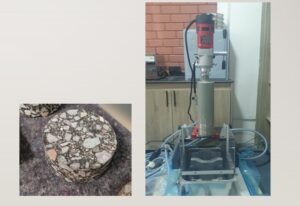NBRRI Laboratory Coring Machine: Precision Sampling for Material Testing
 NBRRI Laboratory Coring Machine
NBRRI Laboratory Coring Machine is a specialized device used by the
Nigerian Building and Road Research Institute (NBRRI) to extract core samples from materials like concrete, asphalt, and rock. These core samples are critical for various material testing applications, including strength analysis, density measurement, and durability assessment. The Laboratory Coring Machine provides a controlled, efficient method for obtaining samples with accurate dimensions, enabling reliable testing for quality control, structural assessment, and research.
Function
The primary function of the NBRRI Laboratory Coring Machine is:
- To drill and extract cylindrical core samples from larger material specimens, ensuring the core dimensions meet testing requirements for accurate laboratory analysis.
This machine allows engineers and researchers to obtain high-quality samples that represent the material’s characteristics, which is essential for evaluating structural integrity, mix design, and material performance.
Applications
The NBRRI Laboratory Coring Machine is used in various testing applications for quality control and research purposes:
- Sampling for Compressive Strength Testing of Concrete and Asphalt:
Core samples are often required for compressive strength testing, which assesses a material’s ability to resist crushing loads. The coring machine produces standardized samples that can be tested under compression to evaluate the structural load-bearing capacity.
- Pavement Quality Assessment:
In asphalt pavements, coring helps assess the pavement’s thickness, density, and compaction quality, essential for understanding performance and longevity. By sampling actual pavement sections, engineers can evaluate in-place properties and determine if the pavement meets quality standards.
- Geotechnical and Rock Testing:
For geological studies, the machine extracts core samples from rock formations, which are then analyzed for hardness, density, and mineral composition. This data is valuable for understanding soil and rock conditions in construction and infrastructure development.
- Quality Control in Mix Design:
The coring machine provides samples that allow engineers to verify the composition and consistency of concrete and asphalt mixtures, ensuring the material meets design specifications and regulatory standards.
- Research and Development of New Materials:
In R&D, core samples are essential for testing innovative construction materials. The machine allows researchers to examine how new formulations perform under controlled laboratory conditions, supporting the development of advanced, sustainable materials.
How It Works
The NBRRI Laboratory Coring Machine operates by drilling into a material sample to extract cylindrical cores with precision and consistency:
- Sample Preparation and Positioning:
The material specimen, whether it’s concrete, asphalt, or rock, is securely positioned on the machine’s drilling platform. The coring bit’s diameter is chosen based on the required core size.
- Drilling and Core Extraction:
The machine’s diamond-tipped coring bit is aligned with the sample, and a controlled drilling force is applied to penetrate the material. The bit rotates and drills into the sample, removing a core cylinder. The machine’s precision allows for smooth, consistent cores without damaging the sample.
- Cooling and Lubrication System:
During drilling, a water or coolant system prevents the coring bit from overheating and reduces dust. This cooling mechanism helps maintain the integrity of the core and the bit.
- Core Sample Collection and Storage:
Once the core is extracted, it is removed from the bit, cleaned, and labeled for testing. Each core sample is ready for further laboratory testing, such as compressive strength, density, or durability analysis.
- Dimensional Verification and Quality Check:
After extraction, the core’s dimensions are verified to ensure it meets testing standards. Any deviations in diameter or length are recorded, ensuring accuracy and reliability in subsequent testing.
The Laboratory Coring Machine’s precise extraction capabilities allow for high-quality samples that provide reliable data for structural assessment and quality control.
Benefits of the NBRRI Laboratory Coring Machine
- Efficient and Accurate Sampling: The machine provides accurate, standardized core samples quickly and efficiently, improving the quality and reliability of material testing.
- Ensures Representative Material Properties: By extracting cores that accurately reflect the characteristics of larger specimens, engineers obtain reliable data for assessing material performance.
- Supports a Wide Range of Tests: The machine’s versatility in extracting cores from various materials makes it useful across multiple types of testing, from pavement evaluation to rock analysis.
- Facilitates Innovation in Material Testing: With precise sampling, the machine enables detailed analysis of new material formulations, fostering advancements in construction material research.
In summary, the
NBRRI Laboratory Coring Machine is a vital tool for obtaining precise core samples from concrete, asphalt, rock, and other construction materials. Its role in quality control, structural testing, and research ensures that construction materials meet the highest standards of performance and durability. By enabling accurate sampling, the Laboratory Coring Machine supports NBRRI’s efforts in infrastructure development, quality assurance, and sustainable construction research.
 NBRRI Laboratory Coring Machine is a specialized device used by the Nigerian Building and Road Research Institute (NBRRI) to extract core samples from materials like concrete, asphalt, and rock. These core samples are critical for various material testing applications, including strength analysis, density measurement, and durability assessment. The Laboratory Coring Machine provides a controlled, efficient method for obtaining samples with accurate dimensions, enabling reliable testing for quality control, structural assessment, and research.
NBRRI Laboratory Coring Machine is a specialized device used by the Nigerian Building and Road Research Institute (NBRRI) to extract core samples from materials like concrete, asphalt, and rock. These core samples are critical for various material testing applications, including strength analysis, density measurement, and durability assessment. The Laboratory Coring Machine provides a controlled, efficient method for obtaining samples with accurate dimensions, enabling reliable testing for quality control, structural assessment, and research.
